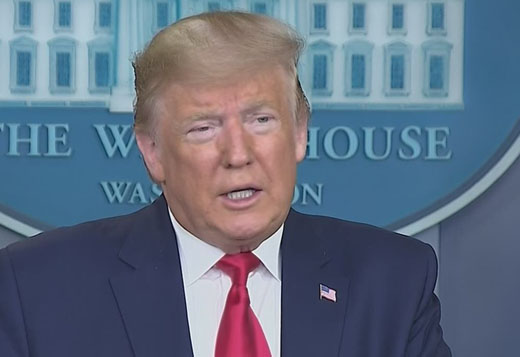by WorldTribune Staff, June 18, 2020
President Donald Trump told the Wall Street Journal that his plan to heal the country’s racial wounds exposed by the death of George Floyd was to build a strong economy.
The president, in an interview published in the Journal on Thursday, expressed cautious optimism that any structural racism that exists in America’s economic and criminal-justice systems is getting better.

“I’d like to think there is not” systemic racism, Trump said, “but unfortunately, there probably is some. I would also say it’s very substantially less than it used to be.”
As for the other crisis the U.S. is dealing with, Trump said the country is nearing the end of the coronavirus pandemic. He added that he believes China may have encouraged the international spread of coronavirus as a way to destabilize competing economies.
“There’s a chance it was intentional,” Trump said.
Trump there is a possibility China may have had economic motives for allowing the virus to spread beyond its own border. Asked if that was to extend economic consequences, Trump said: “Correct. They’re saying, man, we’re in a mess. The United States is killing us. Don’t forget, my economy during the last year and a half was blowing them away. And the reason is the tariffs.”
The president said there was a better chance it was incompetence or a mistake. “I don’t think they would do that,” Trump said about the possibility of Beijing letting coronavirus spread beyond China. “But you never know. But it has had an impact.”
Trump said he was optimistic that recent monthly record gains for jobs and retail sales signaled a quick recovery from the economic downturn that resulted from coronavirus lockdowns.
“We will have created a lot of jobs prior to Nov. 3,” Trump said. “I expect a tremendous increase in GDP. And we’ll be heading for the top. We’ll be back.”
Asked to identify one new initiative he would undertake in his second term, Trump pointed to actions taken the past three years. The president said his focus would be on building “a really strong, powerful economy,” suggesting his plan would rely on a combination of regulatory cuts and negotiating international trade deals.
Trump also criticized John Bolton, his former national security adviser, for writing a book about the president’s handling of foreign policy. In the book, Bolton says Trump’s decision-making prioritized his re-election over the national interest and said the president had a penchant for “giving personal favors to dictators he liked.”
“The only thing I liked about Bolton was that everybody thought he was crazy,” Trump said. “When you walk into the room with him, you’re in a good negotiating position, because they figure you’re going to war if John Bolton was there.”
Trump said he was eager to return to the campaign trail and looking forward to Saturday’s rally in Tulsa. “It’s going to be a hell of a night,” Trump said.
The rally in Tulsa will be Trump’s first since the outbreak of coronavirus. The Trump campaign has said it will do temperature checks and provide masks to attendees, but will not require they be worn. Trump said that some attendees may catch the virus, adding “it’s a very small percentage.”
Asked if he would be fine with Ivanka Trump, his eldest daughter and a senior White House adviser, sitting in the crowded audience inside the arena, he said he would. “First of all she’s young,” he said, adding that elderly Americans were more likely to become severely ill or die from the disease.
Trump said a black Secret Service agent told him the meaning of Juneteenth as the president was facing criticism for initially planning to hold the rally on Friday, June 19.
On June 19, 1921, a mob of white Tulsa residents attacked and killed black community members, destroying a thriving black business district.
Meanwhile, Facebook said it took down campaign posts and ads for Trump, citing violations of the company’s policy against organized hate, the Wall Street Journal reported on Thursday.
The ads, featuring a downward-pointing triangle, targeted Antifa, describing the movement as “Dangerous MOBS of far-left groups.”
The ads asked Trump supporters to back Trump’s calls to designate Antifa as a terrorist organization.
A Facebook spokeswoman said the Trump campaign content had included a banned hate group’s symbol without the context that condemns or discusses the symbol. The inverted red triangle is a marking Nazis used to designate political prisoners in concentration camps, according to the Anti-Defamation League.
“The inverted red triangle is a symbol used by Antifa, so it was included in an ad about Antifa,” Trump campaign spokesman Tim Murtaugh said.
Intelligence Brief __________ Replace The Media
